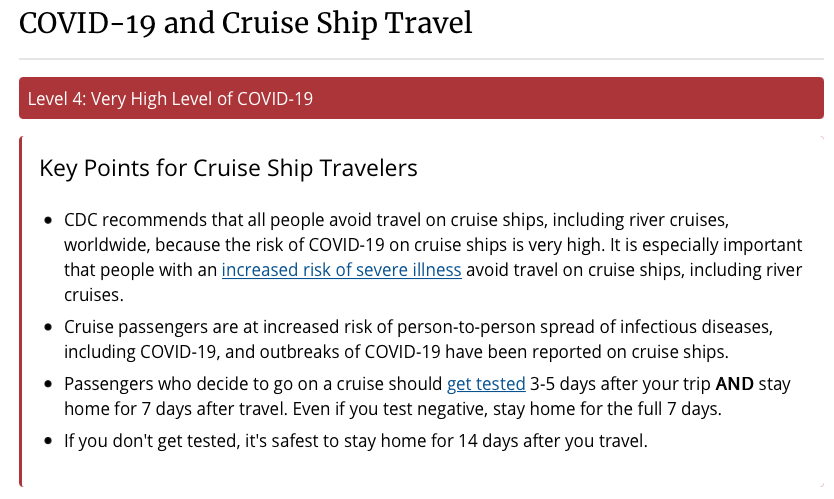The Centers for Disease Control and Prevention set the travel heath notice status for cruise travel to Level 4: Very High Level of COVID-19 (archived link) from level 3. Level 4 was just added on Saturday, November 21, 2020, when the CDC adapted its 3-level notice system to a new 4-level system for COVID-19 (archived link) and updated criteria used to determine Travel Health Notices (THNs) levels. The CDC uses these THNs to alert travelers and other audiences to health threats around the world and how to protect themselves. This new 4-level system categorizes destinations, including international destinations and United States Territories, into the following four levels:
- Level 4: Very high level of COVID-19
- Level 3: High level of COVID-19
- Level 2: Moderate level of COVID-19
- Level 1: Low level of COVID-19
The key points for cruise ship travelers issued by the CDC for Level 4 area as follows:
- CDC recommends that all people avoid travel on cruise ships, including river cruises, worldwide, because the risk of COVID-19 on cruise ships is very high. It is especially important that people with an increased risk of severe illness avoid travel on cruise ships, including river cruises.
- Cruise passengers are at increased risk of person-to-person spread of infectious diseases, including COVID-19, and outbreaks of COVID-19 have been reported on cruise ships.
- Passengers who decide to go on a cruise should get tested 3-5 days after your trip AND stay home for 7 days after travel. Even if you test negative, stay home for the full 7 days.
- If you don’t get tested, it’s safest to stay home for 14 days after you travel.
On October 30, 2020, CDC issued a Framework for Conditional Sailing Order for cruise ships operating or seeking to operate in U.S. waters. The order introduced a phased approach for resuming passenger cruises. Passenger operations continue to be suspended during the initial phases of this Order. The initial phase requires crew screening to determine the prevalence of COVID-19 among all crew members currently on cruise ships in U.S. waters. Cruise passengers are at increased risk of person-to-person spread of infectious diseases, including COVID-19, and outbreaks of COVID-19 have been reported on cruise ships.
At this time, CDC still recommends avoiding any travel on cruise ships, including river cruises, worldwide, because the risk of COVID-19 on cruise ships is very high. It is especially important that people with an increased risk of severe illness avoid travel on cruise ships, including river cruises.
CDC Recommendation – November 21, 2020
While the CDC recommends that travelers avoid cruise travel worldwide, they are not outright banning cruise ship travel. They issued the following recommendations which are especially important as the cruise lines are working through the process to eventually start test cruises, and there will need to be volunteers.
For most travelers, cruise ship travel is voluntary and should be rescheduled for a future date. If you do go on a cruise during the COVID-19 pandemic:
- Do not board a cruise if you are sick, if you know you have COVID-19, or if you were exposed to a person with COVID-19 in the past 14 days.
- Discuss cruise ship travel with your healthcare provider. Older adults and people of any age with underlying medical conditions are at increased risk of severe illness if infected with the virus that causes COVID-19.
- Stay at least 6 feet/2 meters (about 2 arm lengths) from anyone who is not traveling with you. It’s important to do this everywhere—both indoors and outdoors.
- Wear a mask to keep your nose and mouth covered when you are in shared spaces, including when using public transportation.
- Wash your hands often or use hand sanitizer (with at least 60% alcohol).
- Avoid contact with anyone who is sick.
- Avoid touching your eyes, nose, and mouth.
- Do not travel if you are sick.
- If you get sick with symptoms of COVID-19, stay in your cabin and notify the onboard medical center immediately.
Passengers who decide to travel are advised to take the following precautions to protect others for 14 days after their return from a cruise ship or river cruise voyage:
- Get tested 3–5 days after your trip AND stay home for 7 days after travel.
- Even if you test negative, stay home for the full 7 days.
- If your test is positive, isolate yourself to protect others from getting infected.
- If you don’t get tested, it’s safest to stay home for 14 days after travel.
- Avoid being around people who are at increased risk for severe illness for 14 days, whether you get tested or not.
- Always follow state and local recommendations or requirements related to travel.
Where do you stand when it comes to your interest in boarding a cruise ship? Are you ready, would you volunteer to cruise or did you sign up to potentially be a volunteer for Royal Caribbean’s test cruises?


I would rather go on a cruise with the procedures shown than go to a retail location. Retail doesn’t require a negative test. I think the CDC has gone overboard again. I’m not saying there is no risk, just less than most places we generally go on a daily of so basis.